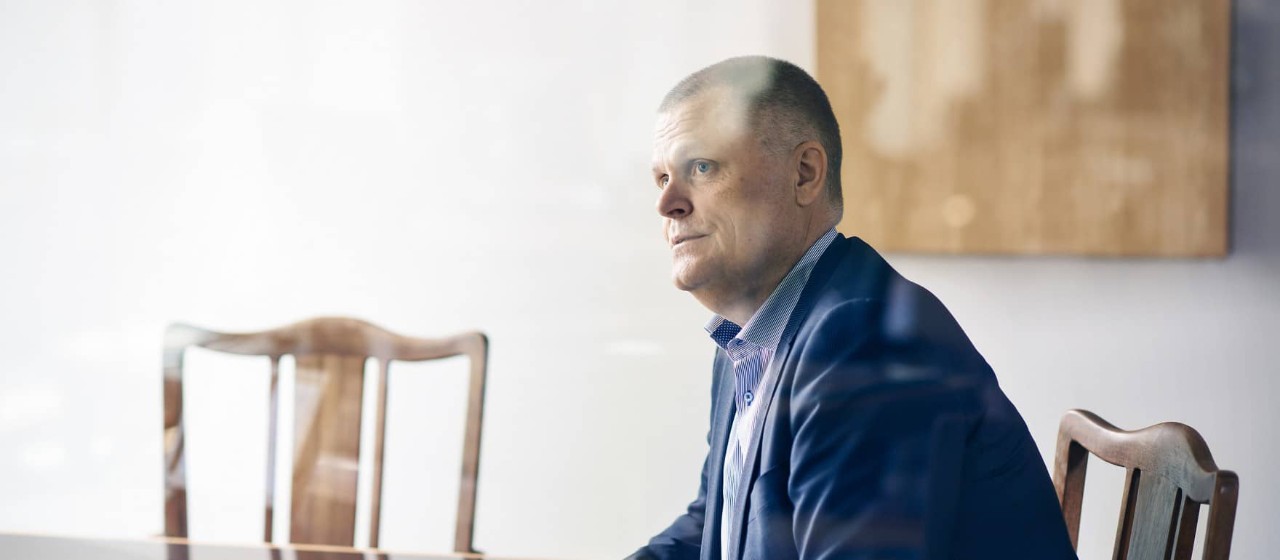
How Johan Haeggman went from trainee at Scania to CFO
11 FEBRUARY 2016
Since joining Scania through the graduate trainee programme, Johan Haeggman has held a variety of roles, accumulating a world of experience along the way. It’s been the perfect preparation for his most important assignment yet.
Johan Haeggman became Scania’s Chief Financial Officer at the beginning of April. When he was younger, he wanted to be a scientist or technician. But after studying mechanical engineering at high school and mathematics and physics at Lund University, he changed direction and pursued a career in finance.
Johan Haeggman, Executive Vice President and CFO at Scania.Johan Haeggman, Executive Vice President and CFO.
A holistic view
In 1989, Haeggman was offered a place in Scania’s graduate trainee programme and he didn’t hesitate for an instant.
“I was interested in a trainee position as I wanted to have the chance to see the whole of the organisation,” he says, adding that his background, with one foot in the technology camp and the other in economics, made Scania an exciting workplace for him, right from the beginning.
After his period as a graduate trainee and three years as Group Manager for a financial control unit, Haeggman headed off to Brazil as Head of Financial Controlling, Accounting and Financial Reporting for the organisation in Latin America.
“To grow in a big organisation, you need to gain lots of experience in different areas,” he says. “It’s also a good idea to try to get stationed abroad for a while.”
Haeggman was involved in building what was to become Scania Latin America, and he later returned to Brazil as Chief Financial Officer for the whole of the Latin American operation.
“It was a fantastic time and I worked with many extremely clever people,” he says. “I can say without hesitation that I left part of my heart in Brazil. At the same time, I was on all of our Latin America company boards and travelling around a great deal, which meant that I developed a great deal of knowledge about the various countries and about commercial operations within Scania.”
Worked in the IT world
Haeggman left Scania at the end of the 1990s to work as Internet consulting company Framfab’s CFO, from where he experienced the whole of the IT bubble from a prime position – including both its build-up and its aftermath.
“It was a completely different world to Scania,” he says. “Their growth rates were completely crazy. Everything was about being the first to market or the first to release a new product; otherwise you were left hopelessly behind. I got to see how fast things can go and how dramatically things can turn around. The most important lesson from this turbulent time was the importance of stability, as well as having control of your strategy, your results and your cash flow.”
After working in the IT world, Haeggman came back to Scania as Head of Corporate Communications.
“I learnt a great deal during these years, and it was exactly the right preparation for the CFO position,” he says. “I think it is very difficult to be a CFO if you aren’t able to communicate. It’s a complex field in which you are constantly communicating internally and externally, with management, the Board and other stakeholders.”
An informal organisational culture
A major contributing factor to Haeggman’s career progression from trainee to member of the Executive Board was, he says, Scania’s company culture and its informal organisational structure.
“The informal organisational structure at Scania isn’t just about fast decision-making channels. It is also about younger staff members having the chance, early on, to have contact with people in leadership positions and, as a result, to gain valuable experience and an understanding of the bigger picture. If you’re able to learn how to deal with members of the company’s management team at an early stage you are able to grow. I believe this is one of Scania’s greatest strengths.”
Haeggman says that a good CFO is proactive and sees things before they happen.
“If you can manage to avoid financial disruptions, then you’ve done a good job. But this is only part of the job. You also need to be open to new proposals and investments, even if they mean increased risk.”
He adds: “It is of course very stimulating to take on this challenge. And it’s extremely enjoyable to work with the whole organisation.”
Fast facts
Name: Johan Haeggman
Age: 55
Position: Executive Vice President and CFO
Family: Married, with two children, aged 18 and 20
Hobbies: Cycling, exercising and a round of golf from time to time
Reads: A lot, mostly fiction and fantasy
Favourite kind of holiday: “I usually prefer to go somewhere where I can combine diving with other experiences.”